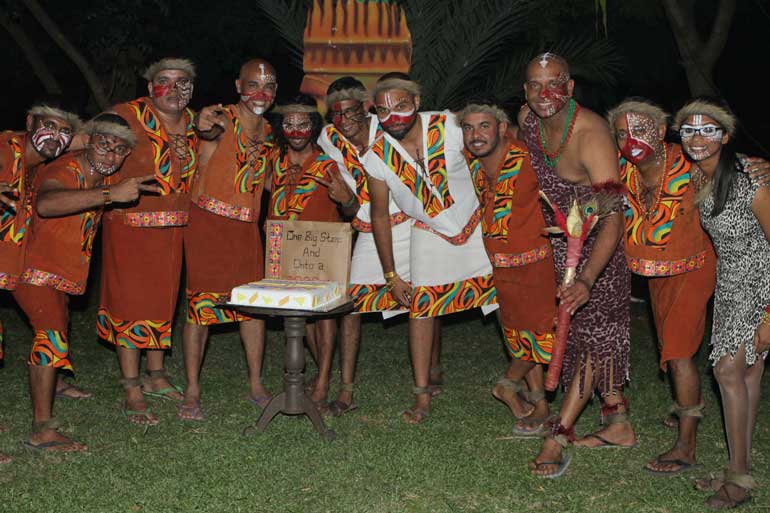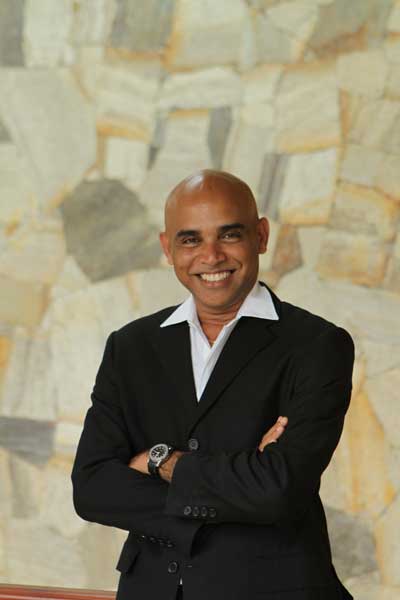Wednesday Feb 18, 2026
Wednesday Feb 18, 2026
Monday, 5 October 2015 00:10 - - {{hitsCtrl.values.hits}}

By Senuri de Silva
What is leadership? Traditionally the answer to that question would bring up an image of someone older, more experienced; someone who can advise his team and tell them what to do; a leader is always imagined to be someone with superior skill.
361 Degrees CEO Rukmal de Silva however believes that leadership means something more. The Daily FT met with him at the 361 office in Nawala to talk about how he has been revolutionising this traditional notion of leadership, and the future plans for the 361 brand that has seen some major changes recently. 
He begins by asking the question, “How did Matthews lead Sanga?” Matthews is younger in both age and experience and yet is able to successfully carry out a leadership role with more experienced players like Sanga. This immediately challenges the traditional notion of a leader as someone older, with more developed skills and the ability to guide his team through orders.
He points out that age or the number of years of experience, don’t define leadership as it should be measured by a different vital skill which he has identified as being ‘the ability to let go of things he need not be in control of’.
According to de Silva , this old school notion of a leader being someone older and more experienced is becoming ‘increasingly irrelevant’ as he says, “Being a leader is not about being a hero,” adding that, “A leader need not come up with all the answers.” This is not to say that a leader need not have those specialised skills.
He believes that this outlook is especially relevant today as more millennials enter the workforce. Millennials are known for being more tech savvy, with new ideas that they are eager to share with the world, they strive for a voice and as de Silva stated, “They need to be given an opportunity to be creative and innovative.” Therefore according to him it is important for leaders of the work force in this day and age to develop the ability to ‘let go’ and create ‘opportunities for young people to contribute’.
The training person from the very programs at 361 degrees is designed to facilitate this change by what de Silva refers to as ‘deep rooted learning’. This kind of learning brings about long-term results by changing the habits and behaviours at the core of an individual. Deep rooted learning is brought about by experiential learning and de Silva explains his training techniques saying, “It’s about providing an experience and allowing people to have certain realisations.”
De Silva also believes that this approach to training is important in this day and age where information is freely available to everyone. He explained, “A role of a trainer is also different in a world that is abundant with knowledge,” as he adds, “Preaching can’t change behaviour.” Instead he says that his training methods contain an element of shock treatment as it helps trainees see that ‘ideal self image is not what’s required in the present day context’.
Deep rooted behavioural changes
The 361 brand has seen some major changes recently. What was formerly three brands specifically; 361 interactive, 361 edge and wild drift, have now been brought under one umbrella of 361 degrees. The name of the company ‘361 edge’ itself represents the holistic approach to training which the company strives to emulate. The internal changes started early on and have already been streamlined for the most part while the external changes were more recent.
The change was deemed necessary in order to give clients a more integrated and comprehensive training plan that better catered to individual needs rather than being centred around the particular approach that was taken towards training by each brand or as de Silva explains, it facilitates “one total solution for all corporate alignment, development and engagement needs.”
For instance, Wild Drift is well known for its outdoor and adventure based training exercises. However with the changes the company is better equipped to adopt certain elements of the Wild Drift approach and combine it with many other techniques and can give clients a training plan that perfectly caters to their need. As the frontrunner in training services and the largest professional training provider in the company, de Silva points out that no other company in Sri Lanka is equipped with the capacity to do the same.
The three main aims of the project are human activation, human rethinking and action towards what the organisation or the individual desires. The programs are aimed at improving the competencies and passion of employees which are driving forward real results and facilitating alignment with company goals.
Training programs go beyond a presentation in a classroom, as he tries to create a memorable experience for his participants. De Silva himself travels around the world to international HR conferences and observes various training programs. He then uses this experience to design unique and creative programs for his clients. For instance the participants might be given a task such as, to create a music video. Such innovative ideas create an interesting and unforgettable learning experience for his clients. He brings out their creativity, problem-solving skills, and the ability to think outside the box but the learning does not stop there. Participants will learn not only to work in teams but also to work with other teams by sharing resources and using the limited facilities that have been made available to them.
Building up scale
The re-structuring has also increased the capacity of the company enabling it to now run five parallel training programs. They have delivered programs spanning from small group sizes of seven to even large groups with up to 2,500 participants.
De Silva believes that these changes will help facilitate more ‘organic growth’ in the company.
Having taken over the B2B market he also hopes to cater to the B2C space and create even more training programs that add to the 150 programs that are carried out each year. De Silva states, “Another area we are looking at moving into is the B2C category in training where we will empower individuals with training capabilities.”
The brand also recently reached an important milestone of its 1000th training program.
The restructuring has also made it possible for the company to change its focus from being based on the type of program to the client’s needs. According to de Silva the restricting has also helped double the revenue with 60% of the staff. “The next level is to bring disruptions,” he said, speaking of catering to newer markets including the foreign companies that are setting up shop here. There are also plans further down the line for the company to promote corporate tourism in Sri Lanka and establish the country as a prime training and development destination.
Leader by example
The CEO also leads by example putting his plethora of knowledge and experience on leadership into practice. This can be seen in the way the company is structured and in the lifestyle he promotes among his employees. One point of interest that shows the unique culture of this organisation is the fact that the company even allows employees to select their own titles according to each individual’s responsibility. Gone, therefore, are the traditional titles and with it, the mundane approach to a particular job.
Instead it is replaced with innovative titles such as ‘fire starter’ and ‘impressionist’ that invoke excitement among employees. This in turn influences their approach to the job and can be seen in the way they carry out their duties with passion and enthusiasm.
Furthermore he practices what he preaches to the companies he conducts training programs on behalf of, by following management techniques such as quarterly evaluations to ensure that the employees are aligned with the company goals.